News from Sen. Blakespear – New Bills and New Committee Assignments!
Greetings!
This is a busy and exciting time in Sacramento, as the new ideas for bills emerge daily! As of Friday, the Legislature had proposed 2,124 bills. Of those, 1,505 were from the Assembly and 619 came from the Senate. Some of these are very small, technical changes and others are system-level changes. The next several months are the committee process where the bills will be changed and refined, and possibly voted on by both houses and then sent to the Governor.
Entering my second year in the Senate, I have a much better feel for how the process works. I spent the entire fall months working with my staff exploring how to address some of our most pressing problems, and we have come up more than 20 bills. Some of the ideas came from you! There’s more on my bills below.
In addition, we have new leadership in the Senate – Sen. Mike McGuire took over for Sen. Toni Atkins as Senate President pro Tempore – and that means there have been changes to committee assignments.
I’m glad that I remain on committees for transportation and housing and as Chair of the Senate Transportation Subcommittee on LOSSAN Rail Corridor Resiliency. And I’m thrilled to get some new assignments, including becoming Chair of the Senate Committee on Elections & Constitutional Amendments and being assigned to the Budget & Fiscal Review Committee and Budget Subcommittee #2 covering resources, environmental protection and energy.
It’s going to be a thrilling year, and I’m eager to get started!
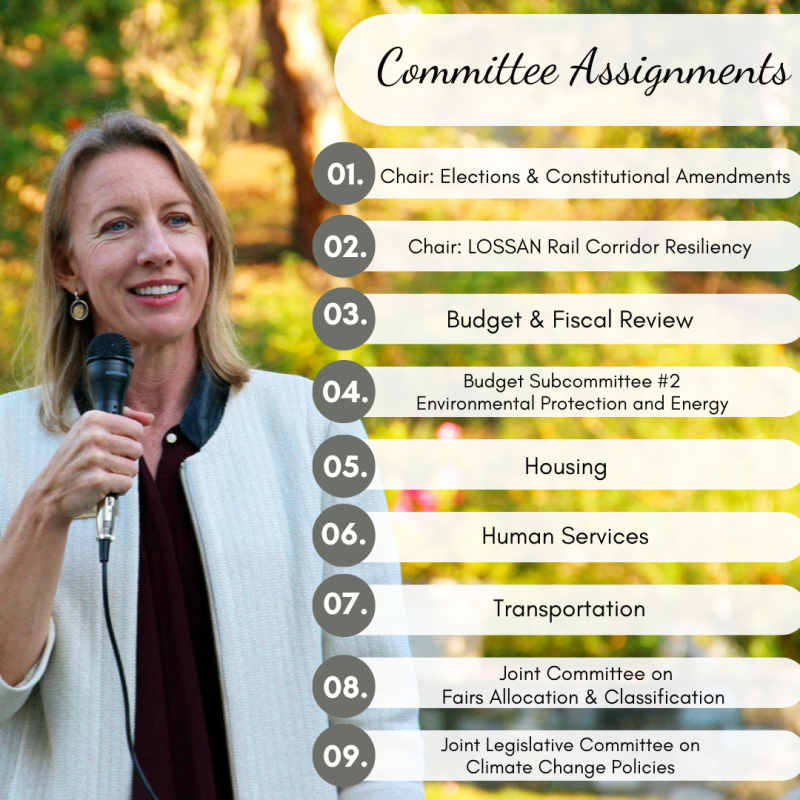
Here is an overview of the legislation I have introduced, grouped by subject area.
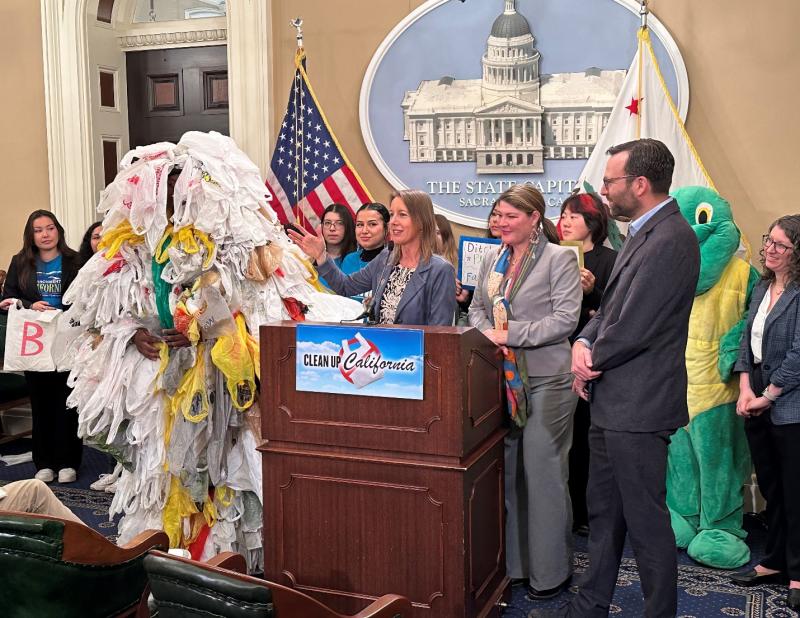
I spoke at a press conference with (to my immediate left) Asm. Tasha Boerner and Sen. Ben Allen regarding legislation to ban plastic bags. We are surrounded by advocates for the bill and the “Plastic Bag Monster,” illustrating how disgusting plastic waste is!
Plastic Bags Ban
I’ve introduced legislation (SB 1053) to prohibit grocery stores from providing plastic bags at grocery checkout. Instead, grocery stores will be able to offer only paper bags when customers have not brought their own reusable bags. This bill is joint authored with Assemblymember Rebecca Bauer-Kahan, D-Orinda, with Sen. Ben Allen, D-Santa Monica, as the principal co-author.
Did you know that the average life span of a plastic bag is 12 minutes? It is then discarded, often clogging sewage drains and over time degenerating into toxic microplastics that contaminate our drinking water, fester in our oceans and fill up our landfills for a 1,000 years. This bill recognizes the reality that although the thicker plastic bags at our grocery stores indicate that they can be recycled, there are in reality no facilities in California that recycle these bags. Analysis of used plastic grocery bags using AirTags has shown that almost none of the thicker plastic bags actually end up recycled. It’s time to face reality. If we want to reduce plastic bags, we need to ban them. Paper works equally well, as places like Trader Joe’s know. The best options is a canvass, reusable bag, which creates no waste at all.
MEDIA COVERAGE
Requiring Reusable Cups at Dine-In Chain Restaurants
I’ve also introduced SB 1167, requiring chain restaurants in California to provide dine-in customers with washable, reusable cups, instead of single-use plastic or paper cups that often end up in landfills.
The legislation follows similar ordinances passed by many cities designed to limit plastic waste coming from restaurants. Plastic food service ware, which includes cups, produces 500,000 tons of waste each year, according to CalRecycle.
California has a massive plastic waste problem, and if we are serious about protecting our environment and living sustainably, we must reduce it across the board. SB 1167 is a simple, sensible step to reduce waste coming from restaurants.
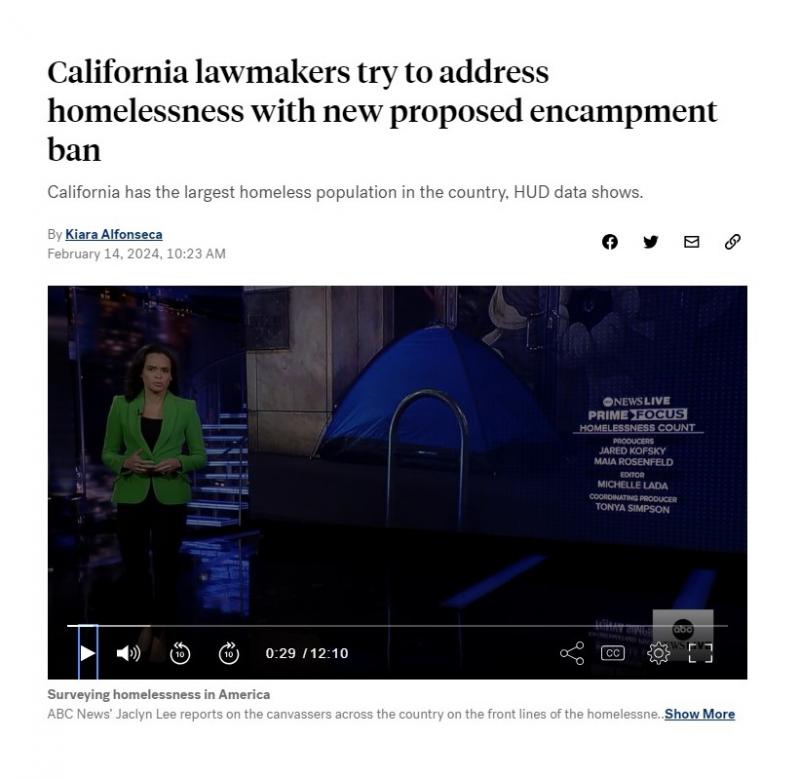
ABC News featured SB 1011 in its reporting on homelessness.
Banning Camping in Public Spaces
One of the housing and homeless bills I am working on is SB 1011. It follows the example of the City of San Diego on limiting areas where people who are unhoused can camp so we can maintain safe, clean spaces and concentrate the location of social services. I am a principal co-author of this legislation authored by Senate Minority Leader Brian Jones, R-San Diego.
Like the City of San Diego, SB 1011 takes a compassionate approach to a camping ban. The law says that camping is prohibited at all times in sensitive areas, which include within 500 feet of schools, in open spaces and at transit stops. When shelter beds are available, camping is prohibited on sidewalks. Those in tents would be issued a notice three days before a cleanup and be provided information on available resources and where it would be safe to camp. The City of San Diego has a Comprehensive Shelter Strategy, which is simultaneously providing more housing, safe camping, safe parking and single-room occupancy options while also trying to reduce the number of people camping in public spaces. People deserve to live inside, and the public deserves to use public spaces as they were intended. We have a lot of work to do here. This bill is following the example of a city that is making a difference.
MEDIA COVERAGE
- Inside California Politics
- ABC News: California lawmakers try to address homelessness with new proposed encampment bans
Other Housing Bills I’ve Introduced
SB 1077 will simplify the permitting process for adding Accessory Dwelling Units (ADUS) and Junior ADUs for residential properties in the coastal zone by exempting projects not near natural resources from Coastal Development Permit (CDP) requirements. Presently, all ADUs in coastal zones must receive a CDP, which can be a complicated and time-consuming process. Under SB 1077, units in eligible areas would only need entitlement permits from their local jurisdictions.
SB 1092 ensures the Coastal Commission has deadlines for making decisions on appeals to housing projects that it accepts. Under current law, the lack of a deadline can cause excessive costs and substantial uncertainty.
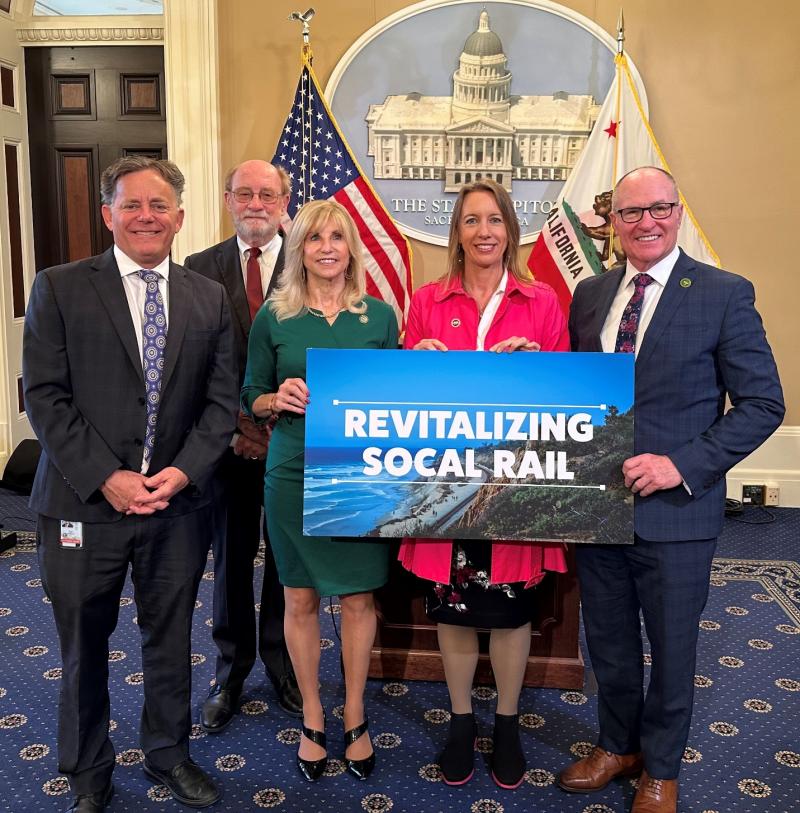
I joined with (left to right), Sen. Josh Newman, Sen. John Liard, Asm. Laurie Davies and Asm. Gregg Hart to announce SB 1098.
Revitalizing the LOSSAN Rail Corridor
I have introduced several bills to improve transportation, including SB 1098. The legislation aims to revitalize the rail corridor that runs from San Diego through six Southern California counties to San Luis Obispo by requiring stronger management, support and direction for the line to optimize passenger service.
The bill follows on the work of the Senate Transportation Subcommittee on LOSSAN Rail Corridor Resiliency, which I chair. The subcommittee has spent the last year investigating the line and its needs. At the subcommittee’s last hearing in December, the Senate Office of Research presented a report detailing the challenges of managing the line. The new legislation addresses many of the issues raised in the report.
A recent Los Angeles Times editorial encouraged the state to take bolder action. “It’s time for Californians and transportation officials to face the inevitable reality: Saving the coastal line means moving it away from the unstable land of the ocean’s edge,” the Times said.
SB 1098 has three main elements. It would:
- Direct the California State Transportation Agency (CalSTA) to create a clear list of prioritized capacity and resiliency projects along the corridor, and recommend any changes to state policies.
- Direct the four metropolitan planning organizations in the corridor to create a locally driven plan that creates a clear path forward for management, governance and operations that results in improved services along the corridor. Those organizations are the San Luis Obispo Council of Governments, Santa Barbara County Association of Governments, Southern California Association of Governments and San Diego Association of Governments.
- Clarify the role of the state secretary of transportation to manage and lead stakeholders to support the LOSSAN corridor.
MEDIA COVERAGE
Other Transportation Bills
SB 689 improves bike safety and access in coastal areas by making it easier for bike lanes to be approved and constructed.
SB 1216 limits state funding for sharrows bike lanes and prohibits them from being used on streets with speeds over 30 mph.

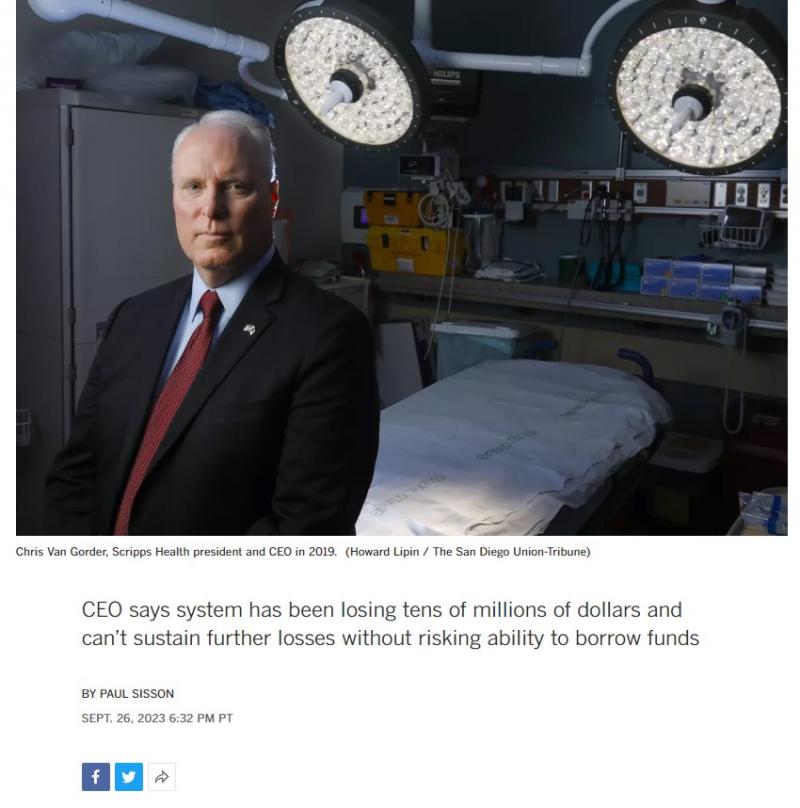 The San Diego Union-Tribune reported last September on Scripps Health exiting Medicare Advantage, a move that forced many seniors to change their insurance policies and face much steeper costs for pre-existing medical conditions.
The San Diego Union-Tribune reported last September on Scripps Health exiting Medicare Advantage, a move that forced many seniors to change their insurance policies and face much steeper costs for pre-existing medical conditions.
Protecting Seniors from High Health Care Costs
One important health care bill I have introduced is SB 1236. It ensures that people seeking Medicare Supplemental Insurance, known as Medigap, are protected from being penalized for having pre-existing medical conditions the same way all Americans are protected in the regular private health insurance markets. Medigap, which requires a monthly payment, is insurance seniors often use in addition to traditional Medicare to cover high-maintenance medical conditions.
Current federal law prohibits private insurers that offer Medigap insurance policies from penalizing seniors for their pre-existing health conditions under a narrow set of circumstances, but outside of these circumstances, the provision does not apply and seniors can be charged exorbitant rates for coverage or can even be denied coverage.
Seniors should have access to affordable healthcare coverage regardless of their health status. SB 1236 makes sure that’s the case.
Last fall, Scripps Health, one of the three major health systems in San Diego County, announced that it would not renew its contract with Medicare Advantage plans due to the plans’ administrative issues and low reimbursement rates. Thousands of patients had to switch providers or change their insurance plans. Under SB 1236, patients could switch to a Medigap plan and still see their providers without an unexpected increase in health costs.
Ensuring Court Room Breaks for Lactation
SB 949 ensures that anyone who is in court and needs to breastfeed or pump breast milk will be given a break to do it. Present law requires the superior court to provide employees with the use of a lactation room and beginning July 1, 2026, to have a lactation room available to the public in any courthouse that has one for court employees. Senate Bill 949 goes a step further and requires superior courts to provide lactation courtroom breaks for a non-employee, such as a lawyer or juror.
Accommodating the needs of mothers and ensuring they can breastfeed or express milk when they need to is essential for the health and well-being of both mothers and their babies. This legislation makes it clear that courts must fully accommodate all people who must be at court, not just court employees.
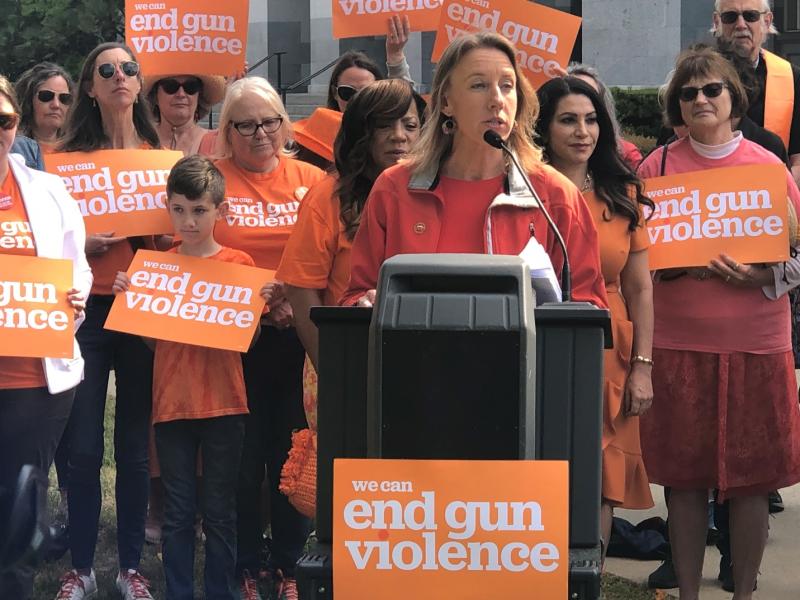
I spoke about the importance of California’s gun safety bills and the need to do more to protect the public from gun violence at a Wear Orange Day rally at the state Capitol last year.
Keeping People Who Are Mentally Ill Safe
I have introduced several bills designed to reduce gun violence, including SB 1002, which is bi-partisan and law-enforcement supported legislation to improve the implementation of a law designed to keep guns out of the hands of people experiencing mental health crises and reduce the risk of gun violence.
Current law mandates that anyone placed on a 72-hour mental health hold must refrain from possessing a firearm. Unfortunately, gaps in the law make it difficult for local law enforcement to ensure that newly prohibited persons turn over their weapons. Because of these gaps, thousands of Californians placed on mental health holds never turn in their firearms.
More than 4,800 people statewide who are required to relinquish their firearms due to mental health-related issues have not done so, according to the latest California Department of Justice statistics. This presents a significant danger not only to the individuals themselves, who face increased risk of suicide, but also to the general public.
Other Gun Safety Bills
SB 1019 ensures that firearms turned in as part of gun-buyback programs or confiscated by law enforcement during investigations are completely destroyed. Currently, parts of guns that are acquired in gun-buyback programs or collected by law enforcement in investigations are sometimes resold online as part of gun kits. Such kits can easily be paired with an un-serialized frame or receiver to create a “ghost” gun for those wanting to evade detection. SB 1019 puts a stop to this practice and requires the firearms to be entirely demolished.
SB 1038 tightens restrictions aimed at eliminating gun trafficking by increasing scrutiny of gun dealer inventory, improving recordkeeping and reducing the time required for people to report lost or stolen firearms from five days to 48 hours.

In honor of Women’s History Month in March, I am inviting community members to nominate women who inspire us with their extraordinary achievements, service or contributions to the community. Nominees must live, work, attend school or volunteer in Senate District 38. Go here to see a map of the district.
I plan to recognize one Woman Who Inspires from both San Diego and Orange counties, and I look forward to holding a reception in March to celebrate the nominees.
You may nominate a Woman Who Inspires by completing the form on our website. Nominees may be in any of the following categories: Business & Entrepreneurship, Community Service & Volunteerism, Education, Health & Human Services, Military Community, Youth Leadership, and Sports. Elected officials are not eligible.
For questions, send an email to Maia Meunier at maia.meunier@sen.ca.gov.
To see the women who were nominated last year, visit this page.
The deadline to apply is March 15, 2024.
Thank you for your support. I am honored to serve you.
In partnership,

CONTACT INFO
To learn more about what I am doing, follow me on social media.
Email me at Senator.Blakespear@Senate.ca.gov
Call my Encinitas district office at (760) 642-0809
Call my Laguna Hills district office at (949) 598-5850
Call my Capitol office in Sacramento at (916) 651-4038


